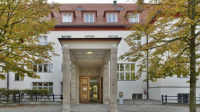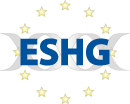8th International Workshop on the History of Human Genetics:
The History of Eugenics and The Evolution of Techniques in Human Genetics
Thursday, June 4, 2020 – History of Eugenics
| 14:00-14:30 | Welcome and Introduction Heike Petermann: Otmar von Verschuer and Human Genetics in Germany |
| 14:30-15:30 | Session 1 – Eugenics in Germany Bernd Gausemeier: Exploring the formation of Human Genetics with Wilhelm Weinberg Susanne Doetz: Eugenics in the GDR |
| 15:30-16:00 | Coffee Break |
| 16:00-17:30 | Session 2 – Eugenics International Andrew Rushton: Bibliometrics and Eminence of British Geneticists |
| 18:15-22:00 | Evening Programme* Walk through University in Berlin-Dahlem – by Jens P. Fürste Afterwards: Dinner at the Harnack-Haus * seperate registration required |
Friday, June 5, 2020 – Human Genetics in Berlin
| 09:00-09:15 | Welcome Heike Petermann |
| 09:15-10:45 | Session 3 – Human Genetics after 1945 in Berlin Karl Sperling: History of Human Genetics in Berlin-West Olaf Riess & Regine Witkowski: History of Human Genetics in Berlin East Stefan Mundlos: Human Genetics in Berlin today |
| 11:00-11:30 | Coffee Break |
| 11:30-13:00 | Session 4 – History of Techniques in Human Genetics I Didier Goidin: Evolution of Array-CGH Nicole Fleischer: Evolution of Next-Generation-Phenotyping Thomas Liehr: Evolution of Molecular Genetics |
| 13:00-13:30 | Lunch |
| 13:30-15:00 | Session 5 – History of Techniques in Human Genetics II Milena Paneque: Technical Influence on Genetic Counselling |
| 15:15-15:45 | Coffee Break |
| 15:45-17:15 | Session 6 – History of Human Genetics – What’s New? From submitted abstracts |
| 17:15-18:00 | Closing Remarks Heike Petermann & Karl Sperling |

Date:
June 4-5, 2020
Location:
Berlin Messe – CityCube
Messedamm 26, 14055 Berlin, Germany
Registration Fees:
Workshop € 75,00
Evening Ticket € 50,00
Download programme as PDF:
Dinner at Harnack-Haus
The Harnack House is located in the center of the German Oxford in Berlin-Dahlem, which is characterized by excellent scientific institutions. It was built in 1929 to provide guest accommodation and a conference venue for the Kaiser Wilhelm Society, the Max Planck Society’s predecessor organization. It established itself in the 1930s as a club for international science and as a social venue in the German capital. Scientists from all over the world, artists, politicians and captains of industry stayed here or came to attend events. Since 2000 the house is conference venue of the Max Planck Society.



